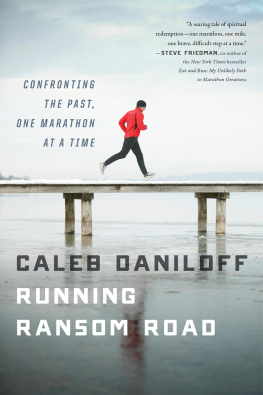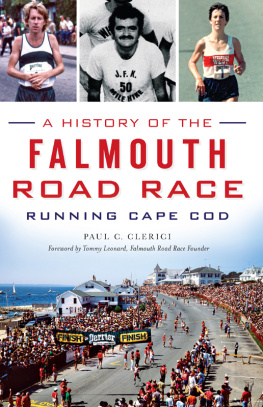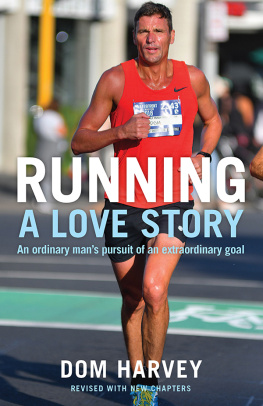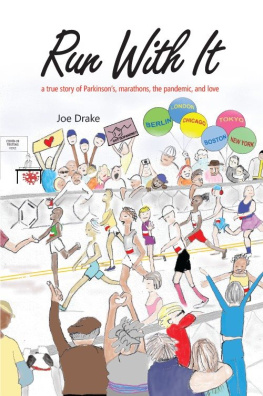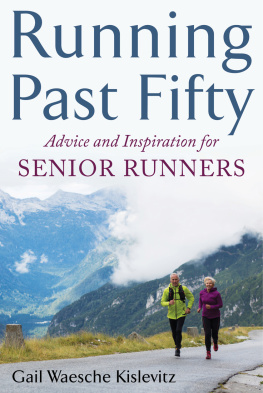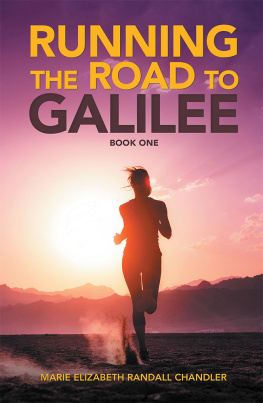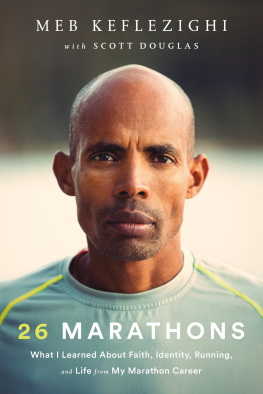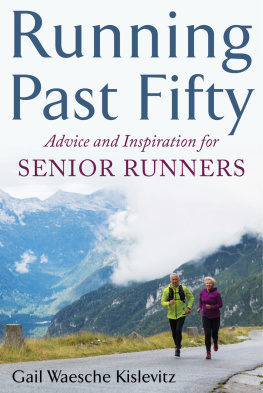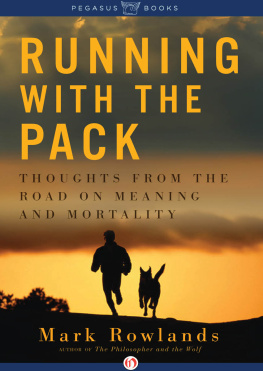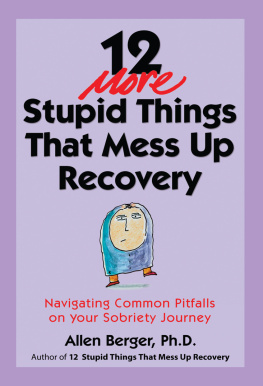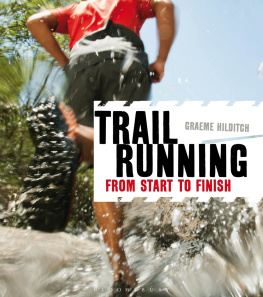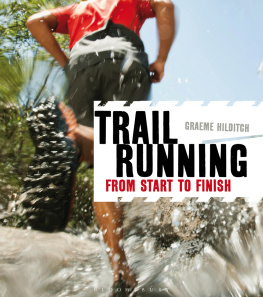First Mariner Books edition 2013
Copyright 2012 by Caleb Daniloff
All rights reserved
For information about permission to reproduce selections from this book, write to Permissions, Houghton Mifflin Harcourt Publishing Company, 215 Park Avenue South, New York, New York 10003.
www.hmhco.com
The Library of Congress has cataloged the print edition as follows:
Daniloff, Caleb.
Running Ransom road : confronting the past, one marathon at a time / Caleb Daniloff.
p. cm.
Includes index.
ISBN 978-0-547-45005-6
ISBN 978-0-544-10543-0 (pbk.)
1. Marathon running. I. Title.
GV1065.D36 2012
796.42'52dc23
Maps by Paul Lobue
eISBN 978-0-547-72584-0
v2.1013
The author is grateful for permission to reprint oh yes, from War All the Time: Poems 19811984 by Charles Bukowski. Reprinted by permission of HarperCollins Publishers.
The excerpt from It Was Easy as Pie, by Sarah Pileggi, is reprinted by permission of Sports Illustrated, from the December 3, 1979, issue.
To Chris and Shea, never a question
Authors Note
While some names have been changed, I have done my level best to faithfully re-create events from my past. Some people may remember the same circumstances differently. We all see things by our own light. This is mine.
Out beyond all ideas of rightness and wrongness, there is a field. Ill meet you there.
RUMI
oh yes
there are worse things than
being alone
but it often takes decades
to realize this
and most often
when you do
its too late
and theres nothing worse
than
too late.
CHARLES BUKOWSKI
Prologue
Longfellow Bridge Loop
March 2008
CAMBRIDGE, MASSACHUSETTS
Its still dark out. Rain smears my bedroom window and pours off the streetlamps into icy puddles below. Drops pelt the sidewalks, splashing furiously off sheets of water as if the world has been set to boil. Its been several days since my last run and the extra weight Im feeling is more than last nights pepperoni pizza. I throw back the covers and tug on socks, windpants, and a jacket. I hear that shiftless part of me whisper, This is stupid; just go back to bed. The voice that had gotten me into trouble over the yearsthat assured me I had room for another drink, another party to crash, could see straight enough to driveis still persuasive, especially when the mercury reads a raw 34 degrees.
For fifteen years, from the ages of fourteen to twenty-nine, I often found myself drunk or hung-over, usually both. In college, I earned the nickname Asshole and proudly answered. Drunkenness was my calling. I worked hard at itat the bars, on the streets, behind the wheel. Pass me that after-shave, goddamn it. No one can black out like me. Needless to say, the only part of me that ran back then was my mouth, whether I was locked in a shouting match with a girlfriend, begging a couple of bucks for a shot, or pleading with a store clerk whod caught me stuffing a bottle of wine down my pants. And those were the good years.
Its been almost a decade since I last wiped Budweiser foam from my lips. I dont wake up hung-over anymore, but I do sometimes wake up hauntedby who I used to be, by the people Ive done wrong. On the days I dont run, its worse. Im filled with a different kind of thirst, a need to move between placesacross bridges, over water, over city lines. The nastier the conditions, the better: lightning storms, ice-covered sidewalks, predawn country roads during hunting season. The hard work of the run fortifies my will. I move through this so I can move through that. One foot in front of the other. One run at a time.
By the time I reach the Charles River, my socks and gloves are sponges, my pants shining with water, my face a mask of rain. A lone minivan rolls down Memorial Drive, spastic wipers manically clearing the windshield. The river gulps at the banks. Even the Canada geese have taken shelter under the trees. Without my glasses, the downtown skyline is a gray smear. Office lights or stars, I cant tell.
Over the years, Id been sent to Alcoholics Anonymous by boarding school administrators and later the courts, but I was never able to connect with the religious-tinged language, the intense gratefulness, the slow, plodding work, the surrender. Everyone seemed older, more grizzled, more committed. I earned myself a thirty-day chip so my friends and parents couldnt call my out-of-control behavior out-of-control. That little blue disk carved with the double As only became a license to party harder. Drinking remained the central fact in my life, its only rhythm.
But after I got sober for real nine years later, the anxieties and insecurities Id tried to cover up with booze still remained. Only theyd morphed as if exposed to radiation. Shyness had become panic. Self-doubt was self-loathing. I didnt know how to be friendly. I was impatient, but my mind was as nimble as a tree sloth. I didnt get jokes, only perceived slights. I was forgetful, quick to tremble, a little unsteady on my feet. Id grown so used to opening my eyes in terror, confusion, and shame over the years that I was sure Id worn permanent grooves into my brainnightmares still jetted from my brains limbic system to the screen behind my eyeballs, smooth bullets fitted into an even smoother chamber. I could taste the absence of vodka in my orange juice.
Harboring memories of disconnect, I chose not to return to the hard-eyed groups and those church basements and instead to gut it out alone. But as those first sober years passed, the details of my offenses, the faces and voices of those I hurt, started to dissolve. The guilt calcified. Over time, the past became a hard lump in my throat, a walnut I had trouble swallowing as I pushed a lawn mower across the grass of my first home, cheered my stepdaughter on the soccer field, made small talk with church-going parents at show-and-tell evenings at the elementary school. I was reserved, quiet, the last person theyd picture vomiting out a car window in a crowded city square, then cracking another beer and toasting the shocked faces.
But when I took up running, I found not only a new central pattern to my life, but a forum in which to confront myself. Have I avoided AA because Im afraid to say, Im an alcoholic in a roomful of strangers? Was it cowardly to write apology letters rather than look people in the eye? Can a former drunk ever be truly happy again?
As I pound across the puddle-filled Longfellow Bridge toward Boston, Beacon Hill shrouded in mist, I grapple with the ghost of me and how it fits within my current form, the one clocking nine-minute miles in motion-control running shoes, with the wife and teenage stepdaughter, the mortgage and aging parents. At the spans last stone bastion, I hop down the slick concrete steps that lead to the pedestrian walkway and wind back down to the river.
On the Esplanade, an empty sleeping bag hangs off a bench, a pair of drenched tennis shoes parked beneath, along with pieces of soggy cardboard, detritus of a homeless life. Often, when I run past the bottle-strewn camps on the riverbank, guys nursing bagged beers and staring at the water, nowhere to go, nowhere to be, I wonder about the fateful combination of decisions and life events that has separated them from the centrifugal forces that keep the rest of us pinned in place. I usually wave as I pass.
In the back of my mind, I harbor a similar wonder about my life. How does a shy, athletic child from a stable family turn into an obnoxious, chain-smoking drunk? I wish I could point to some horrific traumaan abusive babysitter, a terrible car crashthat Ive buried so deep its become somebody elses problem in China. My parents werent big drinkers, though alcoholism had cast shadows on both sides of the family. There was no divorce, no abuse; we lived in safe neighborhoods. Had I taken my teenage itch to fit in too far? Maybe it had something to do with childhood bed-wetting, which burned me with shame and taught me to lie. Depression ran in my dads family.
Next page
